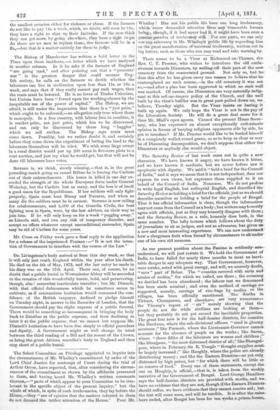The Bishop of Manchester has written a bold letter to
the Times upon these incidents,—a letter which we have analysed in another column. In it he asks if the farmers of England "are going mad," and after pointing out that a "peasants' war" is the greatest danger that could menace Eng- lish society, he calls on the farmers to decide whether the labourers can live in civilisation upon less than 15s. or 16s. a week, and says that if they really cannot pay such wages, then the rents must be lowered. He is no lover of Trades Unionism, but Unions have been "forced upon the working-classes by the inequitable use of the power of capital." The Bishop, we are afraid, is still under the impression that there is a "just price," which ought to be enforced,— an allegation only true where there is monopoly. In a free country, with labour free to combine, it is market-price, not just price, which has to be discovered, and can only be discovered by those long " haggles " which we call strikes. The Bishop says rents must come down. Possibly, but we rather doubt it, and certainly before they come down the experiment of letting the land to the labourers themselves will be tried. We wish some large owner in a rural district would put up 200 acres in five-acre plots to a rent auction, and just try what he would get, but that will not be done till labourers have votes.


































 Previous page
Previous page